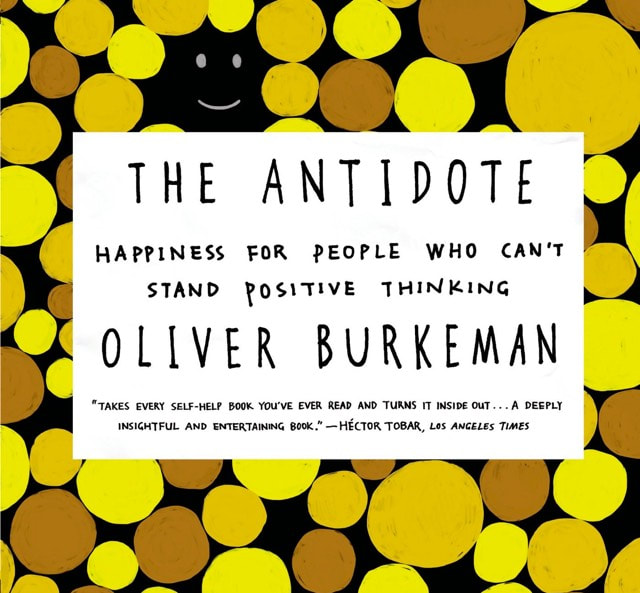|
11/11/2019 0 Comments Book Recap: The Antidote: Happiness For People Who Can't Stand Positive Thinking, by Oliver Burkeman“Eliminate the word ‘impossible’ from your vocabulary!”
It’s epithets like this one that Oliver Burkeman goes after in his book The Antidote, unnecessarily cheesily subtitled Happiness For People Who Can’t Stand Positive Thinking. Don’t let the subtitle mislead you, though - the book itself is a whirlwind tour of unorthodox philosophical and psychological approaches to achieving some degree of inner fulfillment, written with a pleasant degree of snarky British humor and a bevy of compelling and logical concepts. The first chapter sets the stage by pointing out many of the flaws in the hyper-optimistic, ‘cult of optimism’, always-enthusiastic school of positive thinking. Burkeman accurately observes that endlessly positive thinking not only requires constant reinforcement, leading to diminishing returns, but also tends to set a standard of ‘happiness’ that for many people will continually be just out of reach, even as they make progress toward their goals. (To be clear, Burkeman is not critiquing optimism in these pages, but rather the school of positive thinking that insists that regulating one’s thoughts to be positive will lead to happiness.) Each of the next six chapters is dedicated to a modality of thought that the author brands as a ‘negative’ approach to happiness - however, while reading those chapters, one feels that ‘unorthodox’ or ‘unusual’ is a better descriptor for what Burkeman is studying than ‘negative’. These include studies of Stoic (with a capital S) philosophy, which is becoming increasingly popular in ‘productivity guru’ circles, meditation practices espoused by Buddhism, obsessions with goal-setting, and examinations of our reluctance to confront our own previous failures and the thought of death. The most enjoyable aspect of the book is that the discourse is thorough, with Burkeman stitching reader-friendly explanations together with quotations from writers and scientists. Each chapter is also sprinkled with takeaways that can be applied incrementally in one’s own life, such as self-questions, moments of pause, and meditations. For example, one particularly interesting reflection is: “Why do you need to feel motivated to do something before you actually do it? Why not just get to work regardless?” Such a question perfectly fits the unorthodox angle this book brings to discussions of happiness. Though the book doesn’t explicitly aim to be persuasive, it succeeds in doing so: there is an undercurrent of ‘matter of factness’ that runs through the chapters that keeps the reader nodding along. Even in more abstract concepts, such as disentangling our stream of chattering thoughts from our ‘self’ (Eckhart Tolle, Alan Watts), Burkeman is quick to provide explanatory sentences that keep the discussion from becoming too hand-wavy. In summary, The Antidote is a compelling and enjoyable read that imparts the reader with a refreshingly grounded take on finding fulfillment - especially if you’ve had enough of the relentless positivity marketing that is mainstream today. While many people discovered this book through the recommendations of “Getting Things Done” founder David Allen (as did I), the book is by no means limited to self-help or productivity topics, and was well worth the time.
0 Comments
Leave a Reply. |
AuthorArticles, books, research and other items of interest from the C2OPS team. Archives
June 2020
Categories |
Search by typing & pressing enter


 RSS Feed
RSS Feed